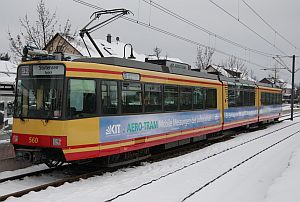Application-oriented projects of the BWPLUS Environmental Research Program – in two of which KIT participates – are in the focus of the twelfth “Status Colloquium on Environmental Research in Baden-Wuerttemberg”, February 24 and 25, 2010, on KIT Campus North. The colloquium is organized by the Karlsruhe Project Management Agency, Baden-Wuerttemberg Research Programs (PTKA-BWP), within Karlsruhe Institute of Technology on behalf of the Environmental Ministry of Baden-Wuerttemberg. Journalists and the interested public are cordially invited. Please register underbwp ∂does-not-exist.ptka kit edu.
On Wednesday, February 24, 9.30 hrs, the Baden-Wuerttemberg Minister of the Environment, Tanja Gönner, will open the status colloquium at the Center for Advanced Technological and Environmental Training (FTU), Hermann-von-Helmholtz-Platz 1, KIT Campus North, together with KIT Vice-President Dr. Alexander Kurz. Dr. Kora Kristof from the Wuppertal-Institut für Klima, Umwelt, Energie GmbH will then present an overview entitled “Resource Efficiency – Chances for the Environment and Economy, Challenge for Politics and Research”.
The colloquium will focus on 20 contributions to current and just completed research projects that are supported by the Ministry of the Environment under the BWPLUS funding program (Baden-Wuerttemberg Research Program Securing a Sustainable Living Environment). KIT is involved in two of the application-oriented research activities in the fields of “Climate and Environment”, “Noise in the Environment”, “Area Management”, “Geothermal Energy Challenge”, and “Thermal Energy Stores”.
Scientists of the KIT Institute of Meteorology and Climate Research (IMK) will present latest results of their “AERO-TRAM” project that is unique in Germany: A tram of the Karlsruhe Transport Authorities equipped with various sensors has been measuring weather data, such as temperature, humidity, air pressure, and wind as well as the most frequent pollutants and the fine dust concentration in the conurbation of Karlsruhe since December 2009. Every day, the tram passes forests, fields, industries, residential areas, and the motorway along the same route.

The AERO-TRAM measures air pollution in the area of
(Photo: Dr. Rayk Rinke)
For the team of IMK scientists under the direction of Professor Christoph Kottmeier and Dr. Rayk Rinke, the tram therefore is the optimum vehicle to analyze and precisely measure air pollution of the conurbation and its causes. “We deliberately decided in favor of this tram, because every day it drives along the same route at fixed times. Using the car as a mobile laboratory, such continuity cannot be ensured,” explains Rinke.
In addition, KIT scientists working in the field of turbo-engines at the Faculty of Mechanical Engineering will present current results of their project “StratiSorp”. Dr. Ferdinand Schmidt and Chirag Joshi are working on a novel stratified storage system to increase the efficiency of adsorption heat pumps and cooling machines. With the help of the new technology, the devices shall use the not needed thermal energy of thermal solar collectors for space cooling as cooling machines in summer. In winter, the systems shall be operated as gas-driven heat pumps. In the longer term, the scientists want to develop economically efficient systems, by means of which existing buildings can be turned into low-energy houses that are comfortable even during hot summers.
The Karlsruhe Project Management Agency (PTKA) within KIT is the partner and co-designer in the funding of scientific research and technical development. Its major task is to support customers in program-based project funding and the dissemination of research results. The Baden-Wuerttemberg Research Programs Division, for instance, is preparing, implementing, and supporting funding programs on behalf of the Ministry of the Environment of Baden-Wuerttemberg and the Baden-Wuerttemberg State Foundation.
Being “The Research University in the Helmholtz Association”, KIT creates and imparts knowledge for the society and the environment. It is the objective to make significant contributions to the global challenges in the fields of energy, mobility, and information. For this, about 10,000 employees cooperate in a broad range of disciplines in natural sciences, engineering sciences, economics, and the humanities and social sciences. KIT prepares its 22,800 students for responsible tasks in society, industry, and science by offering research-based study programs. Innovation efforts at KIT build a bridge between important scientific findings and their application for the benefit of society, economic prosperity, and the preservation of our natural basis of life. KIT is one of the German universities of excellence.

